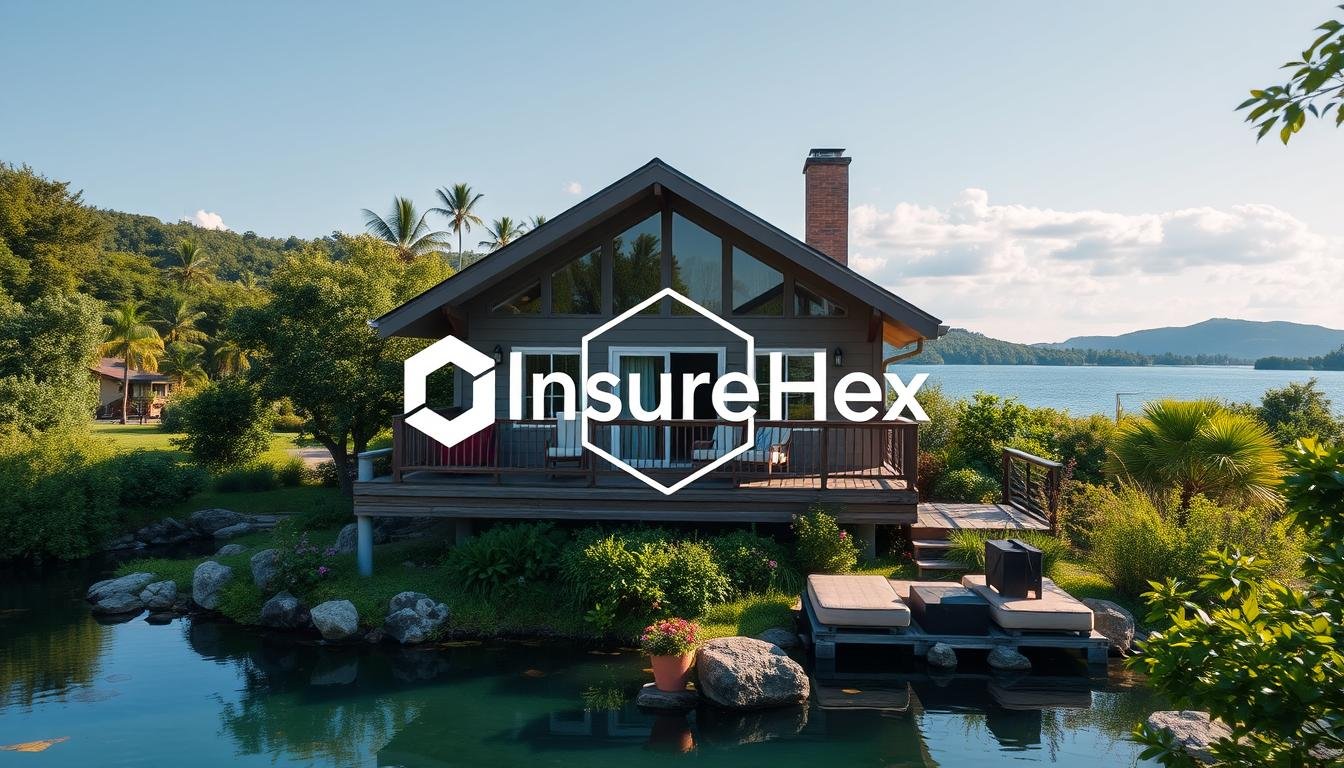Did you know over 1.1 million vacation homes were rented out in the United States in 2022? They made billions in rental income. As the vacation rental market grows, protecting these homes with insurance is more important than ever. We’ll look at the best vacation home insurance providers, key coverages, and how to keep your investment safe.
Key Takeaways
- Vacation home insurance is key for your secondary property. It covers damage, liability, and lost rental income.
- Location, property value, and how often you rent it out affect your insurance rates.
- Shopping around and using discounts can help you get good coverage without breaking the bank.
- Managing risks, like covering rental income and liability, is crucial for vacation homeowners and Airbnb hosts.
- Talking to a knowledgeable insurance agent can help you understand vacation home insurance. They ensure your investment is protected.
The Importance of Vacation Home Insurance
Owning a vacation home is rewarding but comes with risks, especially if you rent it out. A vacation home insurance policy is key to protect against liabilities, property damage, and lost rental income.
Risks Posed by Renting Out Your Vacation Property
Renting out your vacation home brings risks like property damage and liability claims. You could also lose rental income due to unexpected events. Without the right secondary home coverage, you face big financial risks.
Consequences of Being Uninsured or Underinsured
Not having the right rental property insurance or being underinsured is risky. You could face huge financial losses from lawsuits, property damage, or lost rental income. Airbnb host protection is also vital to protect your rental income.
Getting a comprehensive vacation home insurance policy gives you peace of mind. It ensures your investment is safe and your financial interests are protected.
Types of Vacation Home Insurance Policies
As vacation home owners, we have several insurance policy options to consider. It’s important to know the differences between these policies. This helps us choose the right coverage for our unique needs and protects our investment property.
A vacation home owners policy is a common choice. It offers coverage similar to a standard homeowner’s insurance policy. This policy covers the vacation home’s structure, any attached structures, and personal belongings inside. It also includes liability protection if someone gets hurt on the property.
If you rent out your vacation home, a landlord insurance policy might be better. This policy protects the owner’s investment by covering the building, rental income loss, and liability from rental activities. It’s crucial for those facing unique risks from vacation rentals.
For those who list their properties on Airbnb or VRBO, short-term rental coverage is a good option. This policy offers extra protection for personal liability, property damage, and loss of rental income. It’s especially useful during periods of vacancy or cancellation.
| Policy Type | Key Features | Best Suited For |
|---|---|---|
| Vacation Home Owners Policy | Covers the structure, personal belongings, and liability | Vacation home owners who do not rent out their property |
| Landlord Insurance Policy | Protects the owner’s investment, including rental income loss and liability | Vacation home owners who rent out their property |
| Short-term Rental Coverage | Provides additional protection for rental activities, personal liability, and loss of income | Vacation home owners who list their property on platforms like Airbnb or VRBO |
By understanding the different vacation home insurance policies, we can make a smart choice. This ensures our seasonal property or investment property is well-protected, no matter how we use it.
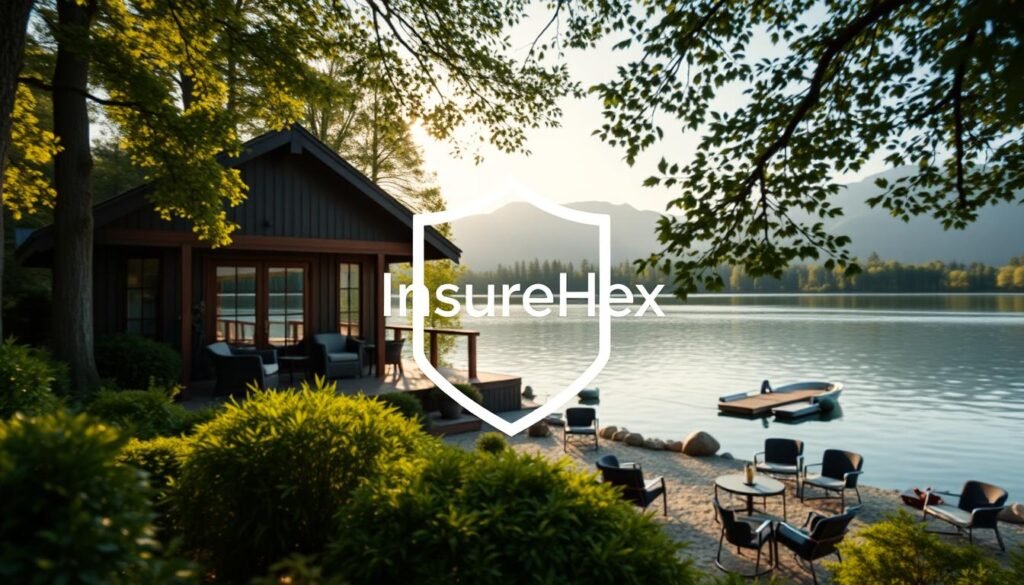
Key Coverages to Look for in a Policy
When picking a vacation home insurance policy, it’s key to make sure it covers what you need. Look for coverage for your home and personal liability protection.
Dwelling Coverage
Dwelling coverage protects your vacation home’s structure, like walls and roof. It also covers attached things like garages or decks. This coverage helps fix or rebuild your home if it’s damaged by things like fire or storms. Having enough dwelling coverage is vital to protect your investment and get your home back to how it was before.
Personal Liability Protection
Liability coverage is a must for your vacation home policy. It helps if someone gets hurt on your property, whether it’s you, your family, or renters. This coverage can pay for legal costs, medical bills, and other damages. Short-term rental insurance and home-sharing insurance often include this important part.
| Coverage | Description | Importance |
|---|---|---|
| Dwelling Coverage | Protects the physical structure of your vacation home | Ensures your property can be repaired or rebuilt after covered damages |
| Personal Liability Protection | Covers legal fees and damages if someone is injured on your property | Safeguards your assets in the event of a vacation rental liability lawsuit |
“Protecting your vacation home and rental income is essential. Make sure your policy covers the critical areas of dwelling and liability.”
Factors Influencing Vacation Home Insurance Rates
Insuring your vacation home can cost differently. Several key factors affect the rates you get. Knowing these can help you choose the best coverage for your money.
Location and Property Value
The place of your vacation home matters a lot to insurers. Areas at risk for natural disasters, like coasts or wildfire zones, have higher premiums. Also, the more your home is worth, the more you’ll pay for insurance.
Occupancy Status and Usage
How you use your vacation home also affects rates. If you rent it out, you might need extra coverage. Insurers usually charge more for rental properties than for personal homes.
| Factor | Impact on Vacation Home Insurance Rates |
|---|---|
| Location | Properties in high-risk areas tend to have higher insurance rates |
| Property Value | Homes with higher values typically have higher insurance costs |
| Occupancy Status | Rental properties often require additional coverage and higher rates |
| Usage | Vacation homes used primarily for personal use may have lower rates |
Understanding these factors helps you find the right insurance. Think about location, value, how you use it, and more. This way, you can protect your vacation home well and within your budget.
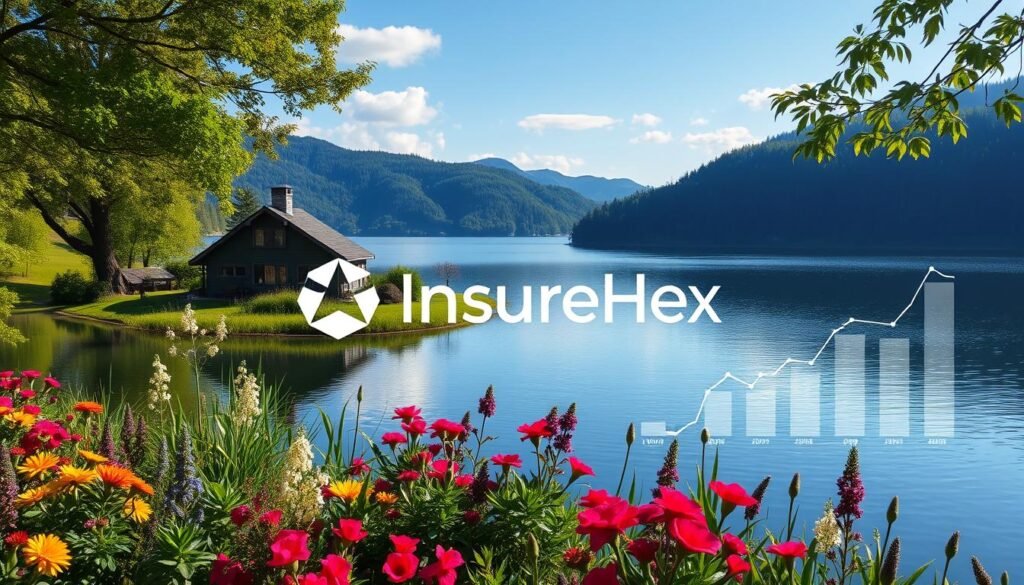
Vacation Home Insurance Providers
Choosing the right insurance for your vacation home is key. We’ll show you top providers in the U.S. They offer great coverage and service. This will help you pick the best for your needs.
Chubb is a leading name in vacation home insurance. They offer wide coverage, including the home, belongings, liability, and rental income loss. Their policies are made for vacation homes, giving you flexibility and customization.
| Provider | Specialty | Coverage Options | Customer Satisfaction |
|---|---|---|---|
| Chubb | Vacation home insurance | Dwelling, personal belongings, liability, rental income loss | Excellent |
| Nationwide | Secondary home insurance | Dwelling, personal property, liability, additional living expenses | Good |
| Allstate | Rental property insurance | Dwelling, personal liability, loss of rental income, equipment breakdown | Very Good |
Nationwide is another top choice for secondary home coverage. They protect your home, belongings, liability, and extra living costs. This makes them a favorite among vacation homeowners.
Allstate is great for those with rental properties. They offer insurance for the home, liability, rental income loss, and equipment breakdown. This gives peace of mind to those who rent out their vacation homes.
When picking a provider, think about coverage, financial strength, and service. Research and compare to make sure your vacation home and rental income are safe.
What to Consider When Choosing a Provider
Choosing the right vacation home insurance provider is key to protecting your investment. Look at their financial strength, reputation, and how they handle customer service and claims. These factors are crucial.
Financial Strength and Reputation
Financial stability and reputation are top priorities. Check for high ratings from agencies like A.M. Best. This shows they can handle big claims. Also, read reviews and ask for recommendations from other homeowners or real estate pros.
Customer Service and Claims Process
Good customer service and claims handling are important. Contact potential providers to see how they respond. Ask about their claims process and if they offer Airbnb host protection or home-sharing insurance.
By looking at these factors, you can find the best vacation home insurance providers for your needs. They will give your vacation property the protection it needs.
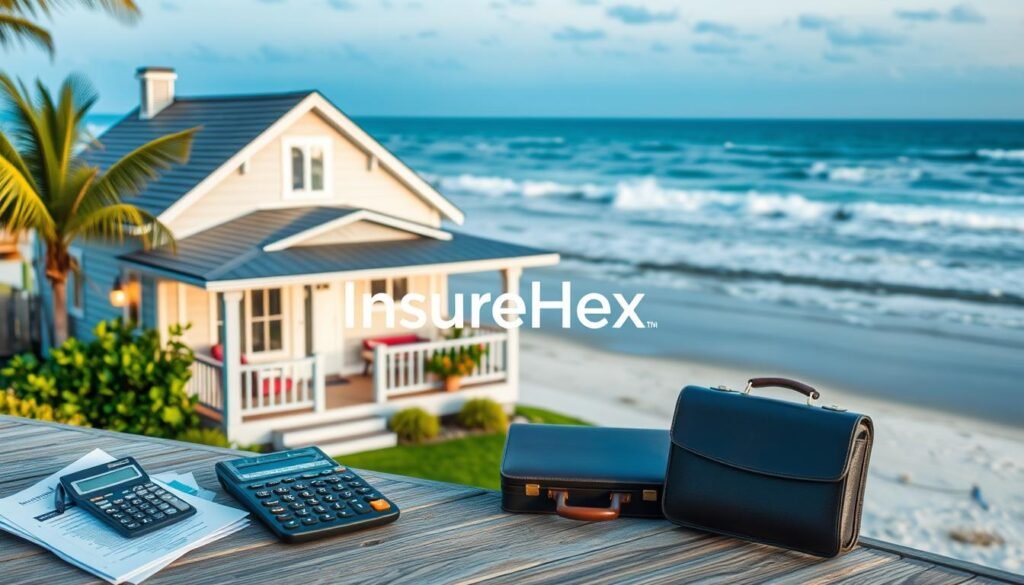
Comparing Quotes from Multiple Providers
Finding the right vacation home insurance policy is key. Comparing quotes from different providers is a crucial step. It helps you find the best rates and the right coverage for your secondary home or investment property.
To compare vacation home insurance quotes well, consider these factors:
- Coverage Levels: Look at each policy’s details, like dwelling coverage and personal liability protection. Make sure the coverages fit your needs and risk level.
- Deductibles: Check the deductible amounts. This can affect how much you pay out-of-pocket if you make a claim.
- Discounts: See if providers offer discounts for things like security systems or bundling policies.
While the cost is important, it’s not the only thing to look at. Also consider the insurance company’s financial health and reputation. Their customer service and claims handling are also key. You want a balance of affordable rates and good coverage for your long-term needs.
By comparing many vacation home insurance quotes, you can choose the best policy for your secondary property. This careful approach helps you avoid coverage gaps and protects your investment from various risks.
Vacation home insurance providers: Balancing Cost and Coverage
Finding the right balance between cost and coverage is key for your vacation home. Vacation home insurance providers offer various policies. Each has its own benefits and things to think about.
Policy limits are a big factor. Higher limits mean more coverage but cost more. Deductibles also affect how much you pay out of pocket for claims. By understanding your risks and needs, you can find a good balance.
Policy exclusions are also important. Vacation rental liability and rental property insurance might be key, depending on your plans. Talking to providers can help make sure your coverage fits your needs.
| Vacation Home Insurance Provider | Ratings | Coverage Options | Discounts |
|---|---|---|---|
| Chubb | A++ | Comprehensive coverage, home-sharing protection | Bundling, security system discounts |
| Amica | A+ | Customizable policies, rental income protection | Loyalty, multi-policy discounts |
| Allstate | A+ | Standard coverage, vacation rental liability | New customer, home alarm discounts |
By looking at your options and talking to experts, you can find the best balance. This ensures your vacation home is safe from risks and liabilities.
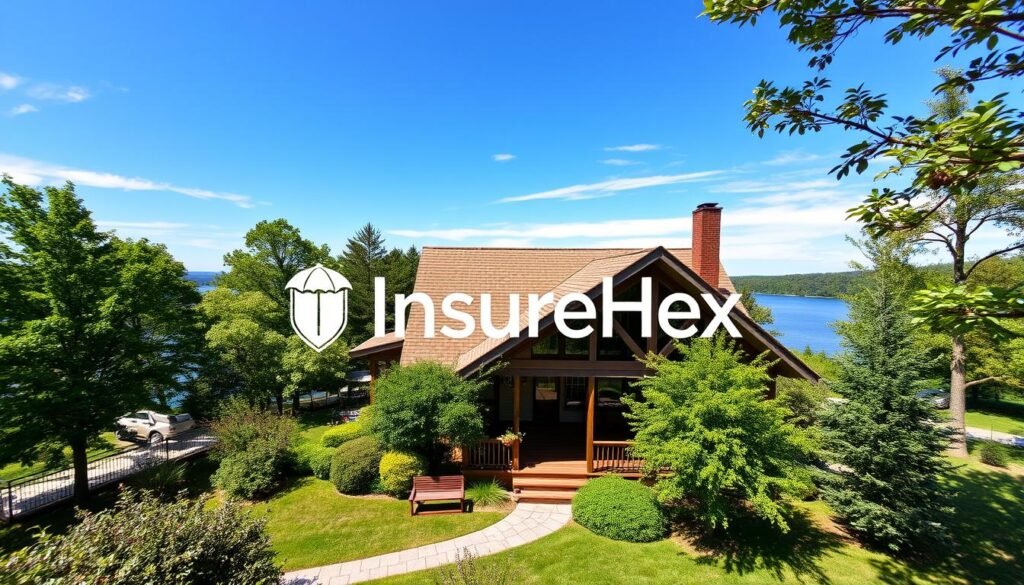
Discounts and Bundling Opportunities
As vacation home owners, we might get discounts and bundling deals. These can help lower our insurance costs. This way, we get great value and protect our secondary home.
Home and Auto Insurance Bundles
One big way to save is by bundling our home and auto insurance. Big insurance companies give discounts of 10% to 25% for both homes. This can save us a lot on insurance costs.
Security System and Safety Feature Discounts
Installing security systems and safety features can also cut our vacation home insurance discounts. Insurers give discounts for homes with burglar alarms, fire extinguishers, and sprinklers. These not only lower our premiums but also protect our secondary home coverage better.
For home-sharing insurance, some providers offer discounts for homes rented on Airbnb or VRBO. Showing we’re taking risks seriously can lead to more savings on our insurance.
Exploring vacation home insurance discounts and bundling deals is key. We should compare quotes from different providers. This way, we get the best coverage at the best price, saving money and protecting our investment.
Managing Risks as a Vacation Homeowner
Owning a vacation home is rewarding but comes with risks. We must protect our investment and keep our guests safe. Here, we’ll look at ways to manage these risks.
Security is key in vacation home risk management. This means installing good alarm systems, ensuring lights are on, and maybe hiring a property manager. These steps help keep intruders away and protect our homes.
Keeping the property in top shape is also vital. Regular checks, quick fixes, and good upkeep prevent damage and keep guests safe. Also, carefully choosing tenants can lower the risk of damage or legal issues.
| Risk Management Strategy | Benefits |
|---|---|
| Comprehensive Security Measures | Deters intruders, safeguards property |
| Proactive Property Maintenance | Prevents damages, ensures guest safety |
| Thorough Tenant Vetting | Reduces risk of property damage, liability claims |
By using these strategies, we can safeguard our homes, avoid expensive claims, and ensure our guests have a great time. Remember, vacation home risk management is a constant effort that needs attention and action.
“Protecting your vacation home is not just about preserving your investment, it’s about creating a safe and memorable experience for all who visit.”
Protecting Your Rental Income Stream
As vacation home owners, we know how vital it is to protect our rental income. Whether you rent out your property for short-term stays or join the home-sharing economy, the right vacation rental income protection is key. It helps safeguard your investment.
Rental Income Loss Coverage
Unexpected events like property damage, natural disasters, or legal issues can harm your rental income. Rental income loss coverage offers financial protection. It ensures you’re paid for lost income and helps you get back to renting quickly.
Vacation Rental Liability Insurance
Short-term rental insurance or home-sharing insurance also protects your liability as a vacation homeowner. It covers you from lawsuits and claims for injuries, property damage, or other guest-related incidents.
With the right vacation rental insurance, you can relax. You’ll know your rental income and investment are safe. This lets you focus on giving your guests an amazing experience.
Tax Implications of Vacation Home Ownership
Owning a vacation home comes with big financial and tax issues. It’s key to know the tax rules for this kind of property.
One big tax issue is deductions. You might get to deduct some of your mortgage interest, property taxes, and upkeep costs. But, how much you can deduct depends on how you use the property and if you rent it out.
Rental income also affects your taxes. If you rent your vacation home, you’ll have to pay taxes on that income. It’s important to know how to report this income and what deductions you can take.
| Tax Implications | Considerations |
|---|---|
| Mortgage Interest Deduction | Deductible based on usage and occupancy status |
| Property Tax Deductions | Deductible, but may be subject to limitations |
| Rental Income Taxation | Rental income is taxable, but expenses can be deducted |
| Capital Gains Tax | Potential for taxation upon sale of vacation home |
Also, selling your vacation home might lead to capital gains tax. This is something to think about when planning for the future. Talking to a tax expert can help you understand and manage these tax issues.
“Understanding the tax implications of vacation home ownership is crucial for making informed decisions and managing your finances effectively.”
Knowing about vacation home tax implications, investment property insurance, and secondary home coverage helps you make better choices. It lets you plan and strategize as a vacation home owner.
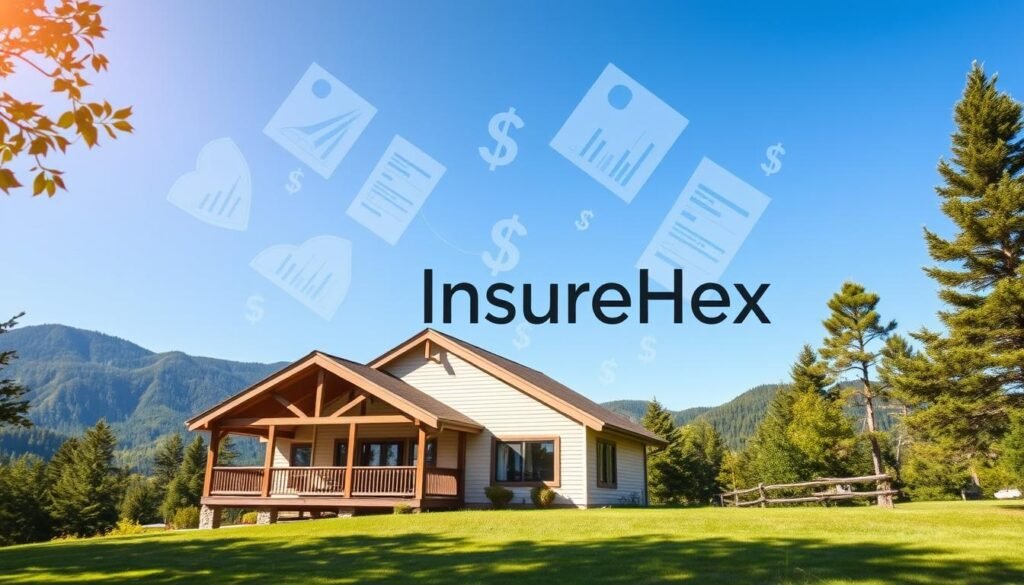
Working with a Knowledgeable Insurance Agent
Dealing with vacation home insurance can be tough. That’s why it’s smart to work with a vacation home insurance agent. They offer tailored advice to find the best rental property insurance for your vacation home or home-sharing business.
An vacation home insurance agent with experience is very helpful. They know all about vacation rental insurance, like liability and income protection. They can spot your risks and suggest the best policy to protect your investment.
They also help with claims and make sure things get fixed quickly. Their industry knowledge and connections can get you great rates and coverage for your vacation home insurance.
Choosing a vacation home insurance agent who knows vacation homes well gives you peace of mind. Your property, rental income, and home-sharing insurance decisions are all in good hands.
“Working with a knowledgeable insurance agent who understands the unique needs of vacation homeowners is crucial in protecting your investment and ensuring you have the right coverage in place.”
Car insurance for electric vehicles: ADAC’s most important tips
Car insurance for electric vehicles: ADAC’s most important tips
Conclusion
Having strong vacation home insurance is key to protect your investment property. It keeps your finances safe. Whether you rent it out or use it for yourself, risks like natural disasters and liability claims are real.
By looking at your investment property insurance choices carefully, you can get the right coverage. This way, you can enjoy your vacation home without worry. You can also save money by getting discounts.
A good vacation home insurance policy gives you peace of mind. It lets you enjoy your home away from home, knowing it’s safe. As you dive into the vacation home life, stay alert and informed. Work with your insurance agent to protect your interests and make the most of your secondary home.

